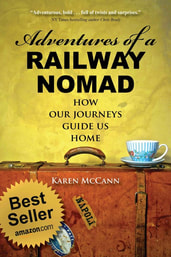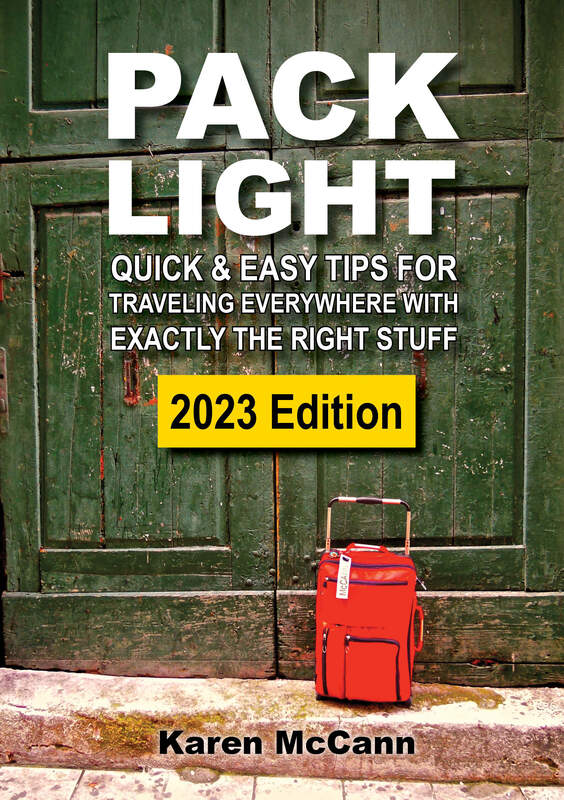|
If you google the phrase, “don’t let your vacation be ruined by…” you get 23,100,000 results earnestly explaining how to avoid flood season, hurricanes, burglars, pickpockets, sub-standard hotel rooms, the stress of traveling with your family, the stress of traveling without your family, ghastly intestinal parasites, jet lag, lost luggage, mosquitos, scams, kidnappers, fire, bedbugs... It’s a wonder anybody ever leaves home. And yet, is a “perfect” vacation really what we want? “I pay top price and expect the best,” an American once told me. “I want to be certain that someone has gone before me every step of the way to make absolutely sure that I’m seeing the best views, eating the best food, and staying at the best hotels.” To me, that’s like paying someone else to take the vacation for you, then following, sheep-like, in his footsteps. Where’s the adventure? The spontaneity? The soaring joy of discovering some utterly unexpected and perfectly enchanting corner of the world all on your own? Besides, what vacation could possibly live up to those standards? When your holiday costs as much as your car, you expect seamless luxury and a peak experience, two things that don’t naturally go hand in hand. If the benchmark is perfection, every trip is going to fall short occasionally; a simple delay at check-in can leave you feeling cheated and disappointed at the “failure” of the trip.  This musician sometimes randomly pops up to serenade us as we dine outdoors in Seville. This musician sometimes randomly pops up to serenade us as we dine outdoors in Seville. Don’t let your vacation be ruined by don’t-let-your-vacation-be-ruined syndrome. Here are five ways to avoid stressing about having a “perfect” vacation. 1. Lower your standards. Don’t set goals like “trip of a lifetime” or “dream vacation.” You can go broke and/or crazy trying to pull that off. Plan trips you can afford with realistic timeframes. Leave room for spontaneous detours, delays, and dawdling. 2. Relax. Take a moment to think about how you want to feel at the end of your holiday. Let’s say it’s relaxed yet energized, with greater clarity of mind and lightness of spirit. Constantly demanding perfection of your environment isn’t likely to get you there. Travel always has its challenges, and the “success” or “failure” of the journey has a lot to do with how graciously you’re able to meet them. 3. Leave your job at the office. Constantly checking emails, phone messages, Facebook likes, and Google Analytics means your mind isn’t on vacation. If you can’t go cold turkey, set aside a few minutes (OK, an hour) a day to deal with the outside world. Then stop. If you can’t … well, you’ve learned something about yourself that you might want to think about. After you check your iPhone again, of course. 4. Prepare to be changed. Before you go, consider how you’d like to be different when you come home. Is your daily life too hectic? Too dull? Too structured? Too directionless? What would you like to learn about the world and yourself? Every journey transforms us, if only into grumpy, exhausted complainers. Maybe you can set a slightly higher goal for yourself than that, and stay open to fresh experiences that might support the changes you have in mind. 5. Take pleasure in the unexpected. It’s how the universe reminds us that we are not, in fact, in control of everything, or even a small portion of it. Which is frankly a relief for people like me, who have a hard enough time managing our email accounts, let alone the course of human events. Rich and I once arrived at a small, charming English hotel to find that the receptionist had disappeared. Other incoming guests loitered about in growing annoyance. Finally, after an absence of 45 minutes, the young man came hurrying to his post, explaining that he’d been up in housekeeping and somehow hadn’t heard the phone. Two minutes later a young maid sidled in, and from the elaborate way she and the desk clerk avoided eye contact with one another, it was pretty clear she’d been upstairs helping him inventory the sheets. I whispered to Rich, “It’s like staying at Faulty Towers.” “Isn’t it great?” he said. “You don’t get this kind of entertainment at the Four Seasons.”
12 Comments
 The great thing about living abroad is that it provides so many fresh new ways to screw up. Any gravitas you might feel you’ve accumulated over the years goes right out the window as you start taking the inevitable social and linguistic pratfalls. Every foreign language is studded with sneaky little trip wires, such as the Spanish word embarazada, which sounds like the English “embarrassed,” but in fact means “pregnant,” creating endless opportunities for misunderstandings and faux pas. Or there’s the word huevos, literally “eggs” but often used as a slang word for testicles. You’ll want to be very careful not to ask the guy at the farmers’ market whether he has eggs; he’ll inevitably reply “Yes, two big ones,” and everyone within earshot will fall about laughing until you flee in confusion and have to find someplace else to buy your breakfast groceries.  Translation: General Danger Translation: General Danger People often say to me, “You’re so brave for living abroad.” But when you think about it, what am I really risking? Most of the time, it’s nothing much: my dignity, some time getting lost in unfamiliar streets, a little money to wily street vendors... Of course, every place has genuine dangers; can you think of an American city where you’d walk the streets late at night without feeling scared? Sensible precautions are always a must (see my post 10 Best Ways to Keep Your Valuables Safe on the Road). But unless travel plans include an active war zone or the like, fear of going abroad generally springs less from realistic concerns than from our inborn fear of the unknown.  Small town cops or flesh-eating zombies? Small town cops or flesh-eating zombies? When you’re on the road, the thing to remember is that what’s terrifyingly unfamiliar to one person is the most comfortable and homey place on the planet to someone else. For instance, thanks to Hollywood, many of our Spanish friends are convinced that ghastly things inevitably befall innocent travelers in America’s small towns. They consider it highly unlikely that you could drive from one end of Iowa to the other without witnessing a murder and being hunted by the killer; running afoul of local law enforcement officials, drug dealers, or aliens; encountering flesh-eating zombies; or worse. Most Andalucíans wouldn’t drive through rural America for any money. Perspective is everything. I recently heard a young Spaniard say, “I lived in America for a year, and I really liked it. But it was hard to give up my freedoms. I couldn’t walk down the street with an open beer in my hand. There were rules and regulations for everything!” Foreign travel is full of surprises; so many things aren’t at all what we expected. As the cult classic book The Hitchhiker’s Guide to the Galaxy puts it, “The Guide is definitive. Reality is frequently inaccurate.” Arriving in an unknown country, you’ll naturally feel that reality has become a bit less precise than usual. You may feel confused and disoriented, even alienated – which isn't surprising since you are an alien.  Wandering Earl, who has been on the road since 1999, says whenever he arrives in a new place, he immediately sits down – right in the train station or airport – and has a coffee while he gets his bearings. I love this idea and plan to adopt it from now on. Instead of launching myself headlong into my new environment, I’ll sit and sip and try to look past the differences to ways that we’re all the same. For instance, I’ll bet everyone in the Подгорица train station hates flesh-eating zombies as much as I do. Right away, we’re on common ground. As is so often the case, the Hitchhiker’s Guide to the Galaxy has distilled this profound wisdom to its very essence. Written across the cover of the Guide, in large friendly letters, are the words “DON’T PANIC.” Great advice to keep in mind, wherever you go in the galaxy. Looking for advice about getting along with your mate during long trips? Oh sure, you can consult self-help books, counselors, psychiatrists, even (carefully selected) clergy. But Rich and I have often found the best sources for realistic, marriage-saving ideas are B-movies and so-so TV shows.  Photo by tommipictures.de/flickr Photo by tommipictures.de/flickr For instance, late one night we were watching an entirely forgettable film about brain-enhanced chimpanzees who were obviously about to outwit the hapless new night watchman with dire results. The first time trouble flares, an old hand warns the newbie, “Never let it escalate.” Rich and I were immediately struck by the profound wisdom of this, and from then on we’ve made it our policy to deal with any personal conflicts early on, when they’re smaller and easier to resolve. We don’t want to wait until our marriage is, metaphorically speaking, overrun with hostile chimpanzee geniuses who have the keys to the weapons cabinet and our car. Another time, in a rather lackluster 1987 production of a Lord Peter Wimsey mystery, the famous sleuth makes a mildly infelicitous remark to the woman he loves, then immediately retracts it, saying, “I beg your pardon. It was a beastly spasm. Won’t happen again.” It beautifully defined the moment as a personal lapse, not a reflection of his true sentiments or a policy statement about the nature of their relationship. Nowadays, when one of us utters a cranky remark we know to be unfair and uncalled for, it can be annulled and forgotten by simply saying, “Sorry. Beastly spasm.” It’s a sort of linguistic “no harm, no foul” ruling. These and other time-tested strategies will be put to use this summer, helping us keep our mental and emotional equilibrium while spending 90 days straight in each others’ company. Our top tips:
1. Develop a routine that gives structure to the day and the week. 2. Spend a little time apart every day, preferably pursuing separate interests that will provide you with fresh topics of conversation. 3. Don’t blame your partner for the weather, the train schedule, or the food. 4. Deal with a potential issue when it’s small. Never let it escalate. 5. Allow each other the occasional beastly spasm. If none of that works, try reminding your partner that you have the keys to the weapons cabinet and his car. When you’re invited to an American home for dinner, you can arrive in the happy confidence that little more is expected of you than praise for your hostess’s cooking, a few carefully chosen quips about what’s wrong with the world, and, if enough wine flows, one or two of your more amusing stories. In other parts of the world, however, it often turns out you are, quite literally, expected to sing for your supper. This is bad news for people like Rich and me, who are among the least musical people on the planet. It’s worse news, of course, for our poor hosts and fellow guests. Together with our friend Phil, Rich and I once cleared an entire karaoke bar in Kobe, Japan, in less than 15 minutes. After that, I decided to confine my singing to the shower. But when we arrived in the Republic of Georgia in the late 90s, we soon learned that during those lean years, entertainment was almost entirely homemade, and we were expected to do our share. Before we could say “karaoke bar,” we found ourselves belting out Yellow Submarine, followed by Help!
Several years later, when Spanish sisters invited us to a barbecue, we were still wiping the pork drippings off our chins when one of the sisters suddenly announced to the two-dozen assembled amigos that the Americans were going to sing. For a second I half expected to look down, notice I was naked, and think, “Well, thank God, it’s only a nightmare.” Unfortunately, it turned out to be real life, and I couldn’t refuse without appearing exceedingly ungracious. Rich and I floundered through “For He’s a Jolly Good Fellow” and let’s just say nobody asked for an encore. At least, not then. But these same sisters, obviously gluttons for punishment, have frequently ambushed us by making similar announcements to various other groups. The last one included the very elderly and infirm residents of a small town’s “third age” home. But by then, I had a strategy all prepared. “The song,” I said in Spanish, “is Deck the Halls. You will all sing ‘fa-la-la-la-la’ ... like this.” Soon everyone was singing, and fragile old ladies and white-haired men in drooping sweaters were dropping their canes and dancing (in some cases, lurching) around the room. Others kept time by banging their walkers on the floor, and soon I was making up new verses as I went along. No matter that it was a hot June afternoon, we really embraced the spirit of the season. Finding ways to entertain your hosts and their friends without the aid of electronics is one of the civilized arts that may someday be lost altogether. But it’s still alive and well in much of the world today. On our travels we often carry puzzles, picture games, flip-books, simple magic tricks, and other props for promoting general merriment. But sooner or later, it usually comes down to singing for our supper. Because in every culture, it’s the simple pleasures – like watching people make fools of themselves – that transcend all cultural barriers. |
This blog is a promotion-free zone.
As my regular readers know, I never get free or discounted goods or services for mentioning anything on this blog (or anywhere else). I only write about things I find interesting and/or useful. I'm an American travel writer living in California and Seville, Spain. I travel the world seeking eccentric people, quirky places, and outrageously delicious food so I can have the fun of writing about them here.
My current project is OUT TO LUNCH IN SAN FRANCISCO. Don't miss out! SIGN UP HERE to be notified when I publish new posts. Planning a trip?
Use the search box below to find out about other places I've written about. Winner of the 2023 Firebird Book Award for Travel
#1 Amazon Bestseller in Tourist Destinations, Travel Tips, Gastronomy Essays, and Senior Travel
BLOG ARCHIVES
July 2024
CATEGORIES
All
|
















